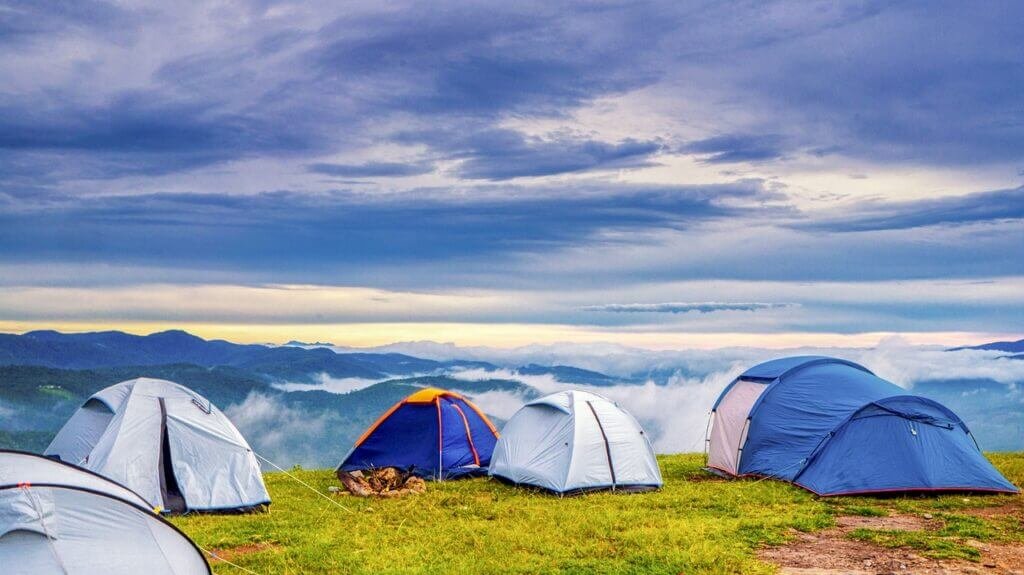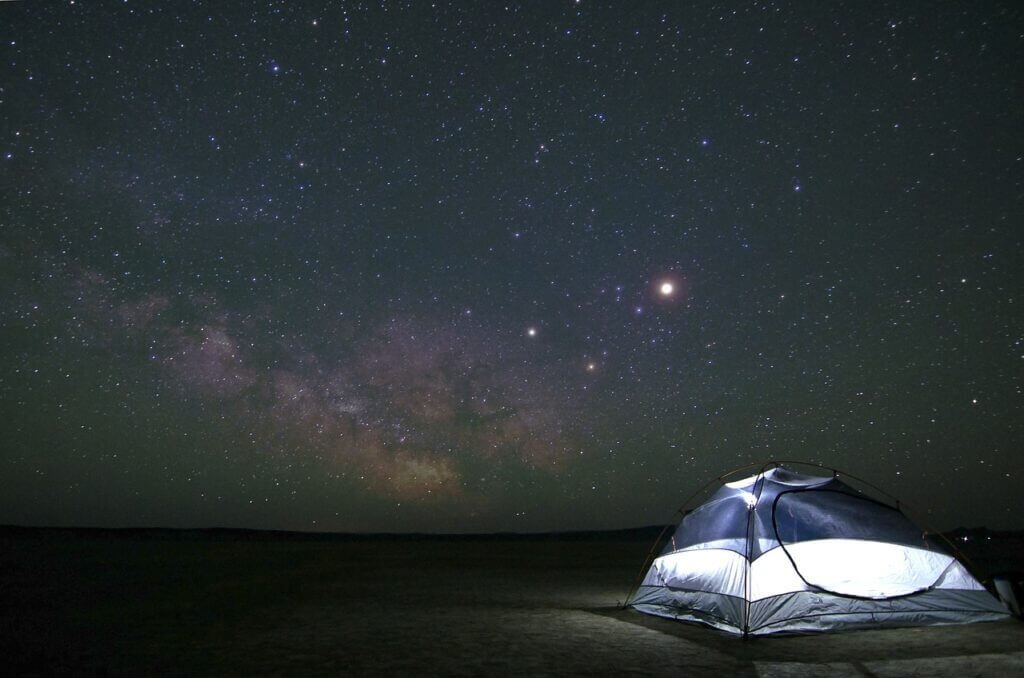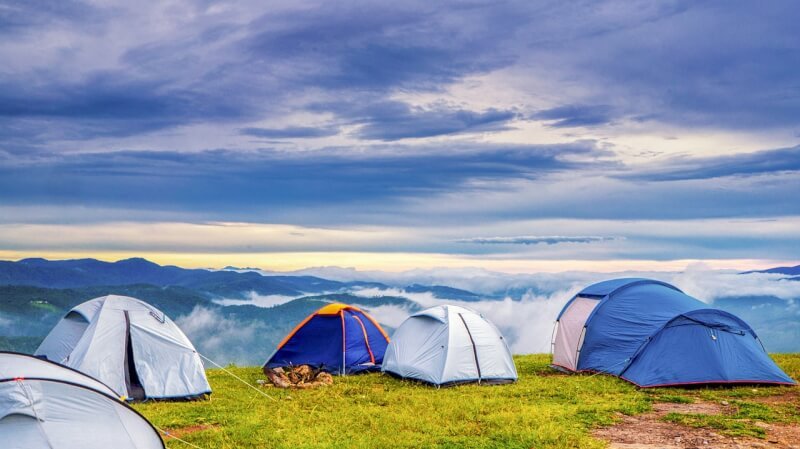Camping with children or pets can be an incredibly rewarding experience, filled with adventure and bonding moments. However, it also comes with its own unique set of challenges. From ensuring safety to providing necessary comforts, finding the best practices for camping with little ones or four-legged companions is essential. In this article, we will explore some expert tips and tricks that will help you make the most out of your family camping trips, making memories that will last a lifetime.

Choosing a Campground
When it comes to choosing the right campground for your family, there are several factors you should consider. Start by researching family-friendly campgrounds that cater to the needs of children. Look for campgrounds that offer activities and amenities designed for families, such as playgrounds, swimming pools, and organized games. This will ensure that your little ones have plenty of entertainment options during your camping trip.
If you’re planning to bring your furry friends along, it’s important to find a pet-friendly campground. Look for campgrounds that not only allow pets but also provide facilities such as dog parks or designated pet areas. Some campgrounds even offer pet-friendly cabins or rentals, so your pets can enjoy the camping experience as well.
Before making a final decision, check the facilities and amenities offered by the campground. Make sure they have adequate restroom and shower facilities, as well as a camp store where you can purchase any essentials you may have forgotten. Additionally, consider whether the campground has hookups for RVs or if they offer rental equipment for activities such as kayaking or fishing.
Lastly, take a look at the nearby activities and attractions. Are there hiking trails, lakes for swimming, or nature reserves where you can explore the outdoors? Consider what types of activities you and your family enjoy and choose a campground that offers easy access to those experiences.
Preparing the Essentials
Once you’ve chosen the perfect campground, it’s time to start preparing the essentials for your camping trip. Begin by packing appropriate clothing and gear for the entire family. Check the weather forecast for your camping location and pack accordingly, including warm layers for cool nights and rain gear in case of inclement weather. Don’t forget comfortable footwear for hiking and exploring the campground.
Food and water are essential for any camping trip, so make sure to bring enough to sustain your family throughout your stay. Plan your meals in advance and pack non-perishable items that are easy to prepare. It’s also a good idea to bring some extra snacks in case of unexpected hunger or cravings.
No camping trip is complete without a well-stocked first aid kit. Include basic first aid supplies such as bandages, antiseptic wipes, and pain relievers. If you or your family members require any specific medications, be sure to pack them as well. Additionally, don’t forget to bring any necessary pet supplies, such as food, water bowls, and medications.
To keep everyone entertained and comfortable during the trip, prepare entertainment and comfort items for both children and pets. Bring board games, books, or even a portable DVD player for the kids. For pets, pack their favorite toys, blankets, or beds to make them feel at home in the new environment.

Setting Up Camp
Once you arrive at the campground, it’s time to set up camp. Start by selecting a suitable camping spot that meets your needs. Look for a level area that is away from hazards such as low-hanging branches or slopes. Consider the proximity to restrooms, water sources, and other amenities when choosing your spot.
If you’re tent camping, pitch your tent in a safe and secure manner. Make sure to follow the manufacturer’s instructions and stake the tent securely to the ground. If you’re using an RV, park it in a designated area and ensure it is properly leveled and stabilized.
Creating a safe play area for children and pets is essential in a campground setting. Set boundaries for kids and pets, and establish rules to ensure their safety. Consider using portable playpens or fences to create a safe space for children to play within your campsite. For pets, bring a dog leash or a portable pet enclosure to keep them secure.
It’s important to keep your campsite clean and organized throughout your stay. Dispose of trash properly in designated bins, and keep food stored securely to prevent attracting wildlife. Encourage everyone in your family to clean up after themselves and maintain a tidy campsite to minimize the risk of accidents or unwanted encounters with wildlife.
Ensuring Safety
Safety should always be a top priority when camping with children or pets. Supervise your children at all times and be aware of their whereabouts. Pay attention to potential hazards such as steep cliffs, bodies of water, or campfire areas, and establish clear boundaries to keep them safe.
To childproof your campsite, take precautions such as covering electrical outlets with plug protectors and keeping matches and lighters out of reach. Keep hazardous items such as sharp tools, cleaning products, and insect repellents in locked storage containers and ensure they are securely stored away.
When it comes to pets, it’s important to keep them on a leash or in an enclosed area to prevent them from wandering off or encountering wildlife. Be mindful of any toxic plants that may be present in the campground and keep your pets away from them. Also, ensure that your pets have proper identification tags and consider microchipping them to increase the chances of a safe return if they were to get lost.
Educating your children on wildlife and outdoor safety is crucial. Teach them about the potential dangers of wildlife encounters and instruct them on how to react when faced with different animals. Additionally, educate them on basic outdoor safety practices such as staying on designated trails and respecting nature.

Engaging in Fun Activities
Camping is all about creating lasting memories and having fun as a family. Plan age-appropriate activities for children to keep them entertained throughout the trip. Consider nature scavenger hunts, hiking adventures, or even organized games like a campground relay race. Engaging children in outdoor activities will not only keep them entertained but also foster their love for nature.
Don’t forget to involve your pets in the outdoor adventures as well. Take them for walks around the campground, play fetch, or even try out dog-friendly hiking trails. Make sure to bring enough water and treats for your pets during these activities, especially on hot days when they may become dehydrated.
Exploring nature trails and observing wildlife is an excellent way to connect with nature during your camping trip. Take your family on hikes to discover the beauty of the surrounding area. Encourage your children to look out for birds, animals, and unique plants, and teach them the importance of respecting and protecting the natural environment.
Playing camping games is a great way to bond as a family and create a sense of togetherness. Set up a game of horseshoes or bean bag toss. If you prefer indoor activities, bring along board games or cards for some family-friendly competition. These games can not only provide entertainment but also help to create lasting memories.
No camping trip is complete without enjoying some campfire activities. Gather around the campfire in the evenings and tell stories or sing songs. Roasting marshmallows and making s’mores is a classic camping tradition that everyone can enjoy. Engaging in these activities will create a cozy and memorable camping experience for the whole family.
Maintaining Hygiene and Sanitation
Maintaining hygiene and sanitation is crucial for a comfortable and healthy camping experience. Practicing proper hand hygiene is essential, especially before preparing food or after using the restroom. Bring hand sanitizer, soap, and water containers to ensure that everyone is able to clean their hands effectively.
Keep a clean cooking and eating area by washing dishes promptly and disposing of food scraps properly. Use eco-friendly biodegradable soap to clean utensils and cookware to minimize harm to the environment. Also, ensure that your food is stored securely to prevent attracting wildlife.
Disposing of waste properly is vital to maintain a clean and healthy environment. Use designated trash bins and recycling containers provided by the campground to dispose of your waste. Avoid littering or leaving any trash behind, and teach your children the importance of preserving nature by properly disposing of waste.
Cleaning up after pets is crucial for maintaining a hygienic campground. Always carry waste bags with you and promptly pick up after your pets. Dispose of pet waste in designated bins or in the campground’s waste disposal facilities. This not only keeps the campground clean but also prevents the spread of disease.
Managing personal hygiene routines is essential during a camping trip. Ensure that everyone in your family has access to toothbrushes, toothpaste, and other personal care items. Plan ahead and bring enough supplies for the duration of your trip. Also, consider bringing portable camping showers or wet wipes to keep everyone feeling fresh and clean.
Dealing with Weather Conditions
Before embarking on your camping trip, check the weather forecasts for your chosen campground. This will give you an idea of what to expect in terms of temperature, precipitation, and potential weather hazards. By being aware of the weather conditions, you can better prepare for your trip.
Preparing for various weather scenarios is important to ensure the comfort and safety of your family and pets. If rain is expected, pack waterproof clothing and extra tarps or rain flies to cover your tents and camping gear. In hot weather, bring sun hats, sunscreen, and lightweight, breathable clothing to protect against the sun.
Make sure that both children and pets stay dry and warm during inclement weather. Pack extra blankets and sleeping bags to provide insulation and warmth. If necessary, create a sheltered area within your campsite using tarps or a canopy to protect against rain or excessive sun exposure.
Creating shade and sun protection is important, especially during hot summer days. Set up a shaded area using a canopy or large umbrella to provide relief from the sun’s rays. This will allow your family and pets to relax and cool down during the hottest parts of the day.
Protecting against insects is crucial to ensure a pleasant camping experience. Use insect repellent with DEET to ward off mosquitoes, ticks, and other biting insects. Additionally, consider wearing long-sleeved shirts and pants to provide an extra layer of protection. Check for ticks regularly, especially after hiking or spending time in wooded areas.
Nighttime Safety and Comfort
Setting up a secure sleeping area is essential for a comfortable and safe camping experience. Ensure that everyone has a designated sleeping area, whether it’s inside a tent, RV, or underneath a canopy. Use sleeping pads or air mattresses to provide insulation and cushioning for a good night’s sleep.
Using appropriate sleeping gear and bedding is important to stay warm and comfortable at night. Bring warm sleeping bags rated for the expected temperatures and consider using sleeping bag liners for added insulation. Don’t forget pillows, blankets, or even stuffed animals for the little ones to provide a sense of comfort and familiarity.
Implementing a nighttime routine for children and pets can help create a sense of calm and ease them into a restful sleep. Establish a consistent bedtime routine, including brushing teeth and reading stories. Provide a cozy space for your pets to sleep, such as a pet bed or a designated area within the tent or RV.
Ensuring adequate lighting at night is crucial for safety and convenience. Pack headlamps or flashlights for each member of your family to use when navigating the campground after dark. Additionally, consider bringing lanterns or string lights to create a warm and inviting atmosphere within your campsite.
Keeping a watchful eye on campfire safety is of utmost importance. Supervise children and pets around the campfire at all times and establish clear rules and boundaries. Keep a designated fire extinguisher nearby in case of emergencies. Always fully extinguish the fire before retiring for the night, using water and ensuring that the fire is cold to the touch.
Keeping Pets Happy and Safe
When camping with pets, it’s essential to prioritize their well-being and happiness. Provide sufficient exercise and playtime to keep them active and engaged during the trip. Take them for walks around the campground or find nearby trails where they can explore and stretch their legs.
Ensure that your pets are well-fed and hydrated throughout the camping trip. Bring enough food and treats to sustain them for the duration of your stay. Pack collapsible water bowls and make sure to provide fresh water at regular intervals, especially during hot weather.
Keeping pets away from wildlife and toxic plants is critical for their safety. Be aware of any potential hazards in the campground, such as poisonous plants or aggressive wildlife. Keep your pets on a leash and supervise them at all times to prevent them from encountering any dangerous situations.
Protecting pets from extreme temperatures is essential for their well-being. Provide shady areas where they can find relief from the sun and keep them hydrated during hot weather. During colder temperatures, provide them with warm bedding and extra blankets to ensure they stay comfortable and warm.
Using identification tags and microchipping your pets is a precautionary measure that can bring peace of mind during your camping trip. Ensure that your pets have identification tags with your contact information and consider having them microchipped. This will increase the chances of a safe return in the unfortunate event that your pet gets lost.
Respecting the Environment
Respecting the environment is not only important for the sustainability of natural spaces but also for future generations to enjoy. Leave no trace and practice Leave No Trace principles, which encourage campers to minimize their impact on the environment. This includes packing out all trash and leaving campsites as you found them.
Avoid damaging plants and wildlife habitats during your camping trip. Stay on designated trails to prevent trampling fragile vegetation and avoid disturbing wildlife. Never feed or approach wild animals, as this can disrupt their natural behaviors and lead to potentially dangerous encounters.
Properly dispose of trash and recycling to minimize your environmental impact. Separate your waste into appropriate bins and containers, following the campground’s guidelines for recycling. If there are no designated recycling facilities, take your recyclables with you and dispose of them properly when you return home.
Minimize noise and disturbance to ensure a peaceful camping experience for everyone. Be considerate of your neighbors and keep noise levels to a minimum, especially during quiet hours. This allows both humans and wildlife to enjoy the tranquility of the natural surroundings.
Respect campground rules and regulations to ensure a harmonious camping experience for all. Familiarize yourself with the specific rules of the campground you are staying at and abide by them. This includes adhering to leash policies, fire safety regulations, and any other guidelines put in place to protect the environment and enhance everyone’s enjoyment of the camping experience.
By following these best practices for camping with children or pets, you can create a safe, enjoyable, and memorable outdoor adventure for the whole family. From choosing the right campground to engaging in fun activities and maintaining hygiene, careful preparation and consideration will make your camping trip a great success. Remember to respect the environment and leave no trace, allowing future generations to enjoy the beauty of nature as well. Happy camping!


